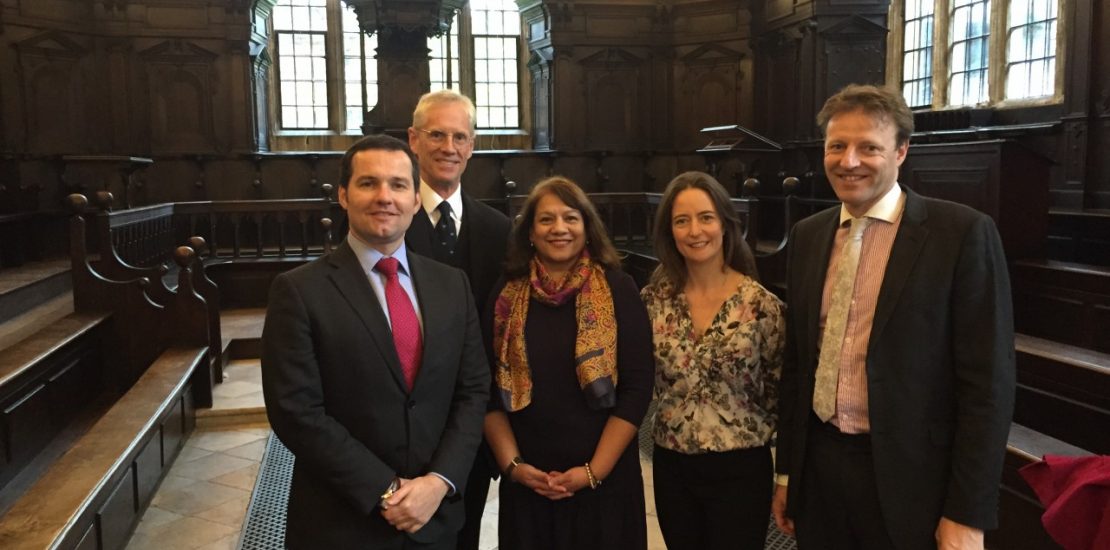- 19/11/2015
- Posted by: Valerie Vaz MP
- Category: Local News, News

The Science & Technology Committee visited Oxford on Thursday 19 November 2015 with a visit to Queen’s College and then Bodleian Library, Oxford as part of ‘Parliament Week’. The photo shows from L to R Chris Greeen MP, Nick Rawlins the Pro- Vice Chancellor, Valerie, Carol Monaghan MP and Derek Thomas MP in Convocation House where Parliament sat when relocated from London to Oxford. See below for the background.
The Bodleian Library, in collaboration with the Department of Politics and International Relations at the University of Oxford, held a one day event for Oxfordshire Sixth Formers to learn more about parliamentary representation and the work of select committees.
We took evidence take as part of an informal seminar (though with the look of a select committee hearing) in the Bodleian’s Divinity School where we heard from Oxford academics: first on the UK’s response to Ebola and second on some of the opportunities and risks of Big Data. The seminar also included questions to the experts from the audience of sixth formers. It was a useful seminar as we heard how the UK responded to the Ebola crisis as it unfolded internationally. For further information about the seminar and the transcript of the hearing: click here:http://www.parliament.uk/business/committees/committees-archive/science-technology/
Parliament in Oxford
Not only can the Bodleian Libraries provide archives and collections related to the work of Parliament, but it also played host to Parliament on four occasions in the 17th century. Simon Bailey, Keeper of the Archives, University of Oxford provides a brief factual summary .
In 1625 this was to avoid the plague then prevalent in London, and the Commons sat in the Divinity School.
Nearly twenty years later, Charles I moved his court to Oxford during the Civil War. The Royalist Parliament, comprising a majority of the House of Lords and about one third of the House of Commons, sat in Oxford in 1644. The Commons sat in the Divinity School and the Lords in the Convocation House.
In 1665, again to avoid the plague, the Lords met in the Geometry School – now part of the Lower Reading Room of the Bodleian – and the Commons in the Convocation House. Other spaces in the Lower Reading Room were partitioned for use as retiring rooms by the King and the Duke of York, the bishops and the lords. Commons committees met in the Divinity School, adjacent to the Convocation House.
In 1681, King Charles summoned the third ‘exclusion’ parliament to Oxford. The Commons wished to exclude Charles’s brother, the Duke of York (later James II), from the succession because he was a Roman Catholic, but Charles was strongly opposed to this and bills had been rejected in the Lords on two previous occasions. Charles chose Oxford on this occasion because London was dominated by the exclusion party, and he felt he could rely on the loyalty of the University. The Lords again met in the Geometry School and the Commons in the Convocation House. Charles took the Commons by surprise by dissolving the Parliament before the Commons could pass another exclusion bill.© Bodleian Libraries, University of Oxford ; www.bodleian.ox.ac.uk
It was good to be back in Oxford as elected Parliamentarians.

